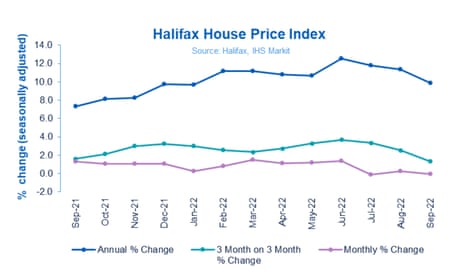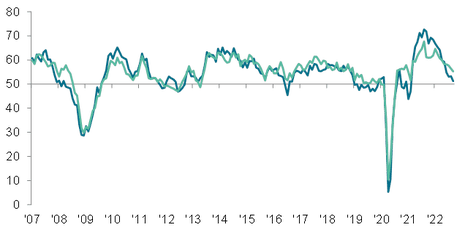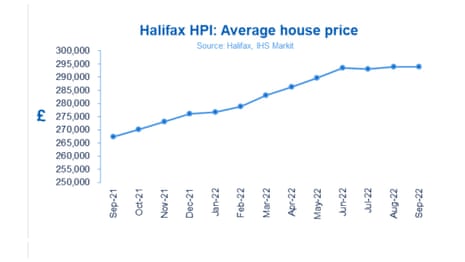[ad_1]
Introduction: UK house prices dropped in September
Good morning, and welcome to our rolling coverage of business, the world economy and the financial markets.
The UK housing market is slowing, and the crisis caused by the government’s mini-budget will make it worse.
That’s the verdict from Halifax this morning. It reports that the average house prices dipped in September, by 0.1%, leaving the average property now costing £293,835.
The annual house price inflation rate slowed for the third month in a row, to 9.9% from 11.4%, the lowest rate since January.

Kim Kinnaird, director at Halifax Mortgages, reports that house prices have been largely flat since June, as the markets entered “a more sustained period of slower growth”.
Kinnaird warns that house prices will come under heavier downward pressure in the months ahead, from rising borrowing costs and the cost of living crisis:
While stamp duty cuts, the short supply of homes for sale and a strong labour market all support house prices, the prospect of interest rates continuing to rise sharply amid the cost of living squeeze, plus the impact in recent weeks of higher mortgage borrowing costs on affordability, are likely to exert more significant downward pressure on house prices in the months ahead.
Kinnaird adds that “this will undoubtedly be a cause of some concern for homeowners”, but points out that recent property price inflation has been unprecented.
It’s important to look at slower growth in this context – since the start of the pandemic average property values have risen by around +23% (almost £55,000) with detached house prices up by more than £100,000 over the same period.”
Interest rate expectations soared during the market panic following the mini-budget, with the Bank of England expected to raise rates towards 6% by next summer.
The average rate on two and five-year fixed mortgages rose over 6% this week, and is expected to keep rising. That is pricing some people out of the market, and leaving others facing a jump in repayments when they remortage.
Yesterday, UK bank bosses raised concerns over the state of the UK’s mortgage market at a high-level meeting at No 11 Downing Street.
Kwasi Kwarteng is now considering extending the government’s mortgage guarantee scheme to help the market. That scheme lets banks and building societies buy a guarantee from the government on the slice of the mortgage between 80% and 95% of the property’s value, to protect them if a property is repossessed.
Also coming up today
The main event for the markets today should be September’s Non-Farm Payroll report, which will show how many jobs were created in America last month.
Economists predict that hiring slowed, to around 250,000 from 315,000 in August, as rising US interest rates slow economic growth. A weak jobs report could encourage the US Federal Reserve to slow its interest rate rises, which might weaken the dollar.
The agenda
7am BST: Halifax house price index
7.45am BST: French trade balance for August
9.30am BST: UK labour productivity for Q2
1.30pm BST: US Non-Farm payroll report
Key events
Filters BETA
UK economy predicted to be weak till 2024 despite Truss growth agenda

Richard Partington
Britain’s economy is expected to take until 2024 to recover to pre-Covid levels amid a slowdown for hiring and business investment, as households and businesses struggle with soaring costs.
Business leaders have said that there has been a significant decline of key economic indicators in recent weeks, with confidence among company bosses over the growth outlook collapsing to the lowest level since the depths of the Covid crisis.
Knight Frank: House prices have probably peaked
Tom Bill, head of UK residential research at Knight Frank, predicts that house prices will fall over the next two years:
“It’s a fairly safe bet that UK house prices have now peaked. The impact of rising mortgage rates will begin to hit demand and spending power in coming months, which we believe will lead to a fall of 10% over the next two years for UK prices.
We may see mortgage rates fall to some extent if financial markets become more reassured by the government’s economic plan but the events of the last fortnight have been a reminder that the era of ultra-low rates is coming to an end.
UK recruitment slowed in September as economic problems mount
The latest survey of the UK labour market also shows that the economy may be on the turn.
Growth in demand for permanent and temporary staff weakened in September, to the lowerst since February 2021, according to KPMG and the Recruitment & Employers Confederation.
The weaker economic outlook led some firms to be more cautious about hiring, and also discouraged some people from changing jobs.
A generally low unemployment rate, skills shortages and Brexit also weighed on candidate availability, the survey adds.

Claire Warnes, head of education, skills and productivity at KPMG UK, says some firms are bracing for a downturn.
Some employers, even those who anticipate that the recession may be short, are taking steps now to contain costs, including hiring freezes.
Those employers who continue to invest in their workforce, particularly upskilling, may find they weather the recession better and will be in a stronger position to benefit from the upturn as and when it comes.”
London saw the biggest rise in permanent staff appointment, while the South of England saw the first reduction in 19 months.
September’s house price fall is probably a sign of things to come, says EY ITEM Club
House prices are likely to fall by at least 5% over the next year, the EY ITEM Club says.
Martin Beck, chief economic advisor to the EY ITEM Club, says rising interest rates will push down demand, and restrict what lenders will offer.
“Weakness in prices in September is likely to be a sign of things to come, reflecting cost of living pressures and the recent rise in market interest rate expectations and mortgage rates. Granted, current market expectations for Bank Rate to rise to 5.5% by mid-2023 look too high.
“Raising rates to that level would likely prompt a substantial decline in the housing market, a deep recession and inflation eventually falling well below the Bank of England’s 2% target and potentially into negative territory. Instead, the EY ITEM Club expects Bank Rate to peak at 4%.
However, rates at that level would still significantly reduce demand for properties and decrease the size of loans that lenders can offer. Combined with the weakening economic outlook and squeezed household incomes, the EY ITEM Club expects property values to fall by 5% or more over the next year or so.
You’d think that falling house prices would help people to get onto the housing ladder.
But if mortgage rates do keep climbing, prospective first time buyers may find they’re stilll priced out of the market.
The Bank of England has already raised interest rates six times in a row, from 0.25% at the start of the year to 2.25% in September, with a very sizeable increase experted in November.
Avinav Nigam, cofounder of real estate investment platform, IMMO, says these rising borrowing costs have already had an effect on the market, and are hitting affordability.
The slowdown in house price growth for September was expected as higher interest rates in May and June kicked in, which feed through to transactions data now due to the time lag of conveyancing.
We are seeing property listings falling by 15 to 20 per cent in some parts of the UK, as uncertainty encourages property owners to delay transaction decisions.
‘The rapid pace of growth we have seen in recent years is coming to an end, partly due to recent interest rate hikes by the Bank of England and the crash of the pound following the government’s mini budget.
‘It’s predicted that house prices could correct by as much as 7 to 10 per cent in coming months. However, we don’t expect a house price growth reversal to improve the affordability of housing much due to fast rising interest rates. Mortgage lenders are starting to require consumers prove they can afford 7% interest rates, as an indication of where rates could go.
Interest rate rises are putting off new buyers
Fears of rising interest rates are cooling the markets, reports North London estate agent Jeremy Leaf:
‘New buyers are pausing for breath while they consider the likely pace and size of future interest rate hikes, so activity is reducing. The question is whether worries about rising mortgage payments outweigh the benefits of the recent stamp duty reduction, particularly for first-time buyers.
‘The mini Budget sparked a chain reaction of unintended consequences raising buyer concerns that any savings in stamp duty and other taxes would be more than offset by mortgage rates rising much more quickly and higher than expected.’
Property buying agent Emma Fildes of Brickweaver points out that annual house price inflation is now back in single figures (for the first time since January). Could the long run of growth be approaching a dead end?
According to @HalifaxBank AVG house prices decreased by -0.1% to £293,835 in September. With annual growth falling, from its long run in double digits, to 9.9% from +11.4% in Aug, could the UK property market road for growth be approaching a dead end? pic.twitter.com/23pQBLZXxa
— Emma Fildes (@emmafildes) October 7, 2022
Rising mortgage rates are the main blocker for buyers seeking to get on the property ladder and those hoping to move up it, agrees Myron Jobson, senior Personal Finance Analyst at interactive investor:
“Mortgage affordability is a mushrooming pain point for buyers. Mortgage rates have been on the up in line with increases to the Bank of England’s base rate, but rates have typically spiked by between one and two percentage points two weeks on from the mini-Budget.
The difference amounts to hundreds in pounds and pence terms, and it means that buyers can’t afford as much house as they could 14 days ago.
Wales sees fastest house price rises, but London lags
Wales remains at to the top of the table for annual house price inflation with a rate of +14.8%, down from +15.8% in the previous month, Halifax says.
The average property in Wales now costs £224,490.
London still has the slowest rate of annual growth amongst the UK nations and regions, with house prices rising by +8.1% over the last year. But properties in the capital are still the most expensive, with the average costing £553,849.

Introduction: UK house prices dropped in September
Good morning, and welcome to our rolling coverage of business, the world economy and the financial markets.
The UK housing market is slowing, and the crisis caused by the government’s mini-budget will make it worse.
That’s the verdict from Halifax this morning. It reports that the average house prices dipped in September, by 0.1%, leaving the average property now costing £293,835.
The annual house price inflation rate slowed for the third month in a row, to 9.9% from 11.4%, the lowest rate since January.

Kim Kinnaird, director at Halifax Mortgages, reports that house prices have been largely flat since June, as the markets entered “a more sustained period of slower growth”.
Kinnaird warns that house prices will come under heavier downward pressure in the months ahead, from rising borrowing costs and the cost of living crisis:
While stamp duty cuts, the short supply of homes for sale and a strong labour market all support house prices, the prospect of interest rates continuing to rise sharply amid the cost of living squeeze, plus the impact in recent weeks of higher mortgage borrowing costs on affordability, are likely to exert more significant downward pressure on house prices in the months ahead.
Kinnaird adds that “this will undoubtedly be a cause of some concern for homeowners”, but points out that recent property price inflation has been unprecented.
It’s important to look at slower growth in this context – since the start of the pandemic average property values have risen by around +23% (almost £55,000) with detached house prices up by more than £100,000 over the same period.”
Interest rate expectations soared during the market panic following the mini-budget, with the Bank of England expected to raise rates towards 6% by next summer.
The average rate on two and five-year fixed mortgages rose over 6% this week, and is expected to keep rising. That is pricing some people out of the market, and leaving others facing a jump in repayments when they remortage.
Yesterday, UK bank bosses raised concerns over the state of the UK’s mortgage market at a high-level meeting at No 11 Downing Street.
Kwasi Kwarteng is now considering extending the government’s mortgage guarantee scheme to help the market. That scheme lets banks and building societies buy a guarantee from the government on the slice of the mortgage between 80% and 95% of the property’s value, to protect them if a property is repossessed.
Also coming up today
The main event for the markets today should be September’s Non-Farm Payroll report, which will show how many jobs were created in America last month.
Economists predict that hiring slowed, to around 250,000 from 315,000 in August, as rising US interest rates slow economic growth. A weak jobs report could encourage the US Federal Reserve to slow its interest rate rises, which might weaken the dollar.
The agenda
7am BST: Halifax house price index
7.45am BST: French trade balance for August
9.30am BST: UK labour productivity for Q2
1.30pm BST: US Non-Farm payroll report
[ad_2]
Source link